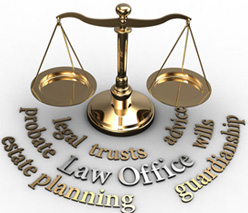
Practice Areas

Trusts
A Trust Agreement is an instrument created by an individual with specific directions to another, (the Trustee) regarding the management and distribution of assets during life and after death, to a beneficiary or beneficiaries.
One trust which is popular in estate planning is a living trust (also known as a revocable trust). A living trust is a written legal document that partially substitutes for a Will. Living trusts are commonly used as part of an estate plan, also known as a revocable trust or trust agreement. Essentially, the living trust is your alter ego. A trust can be used to manage assets during incapacity, hold and manage funds for minor children, heirs or individuals with special needs, protect inheritance, convey gifts, or reduce or eliminate estate taxes.

The benefits to having a living trust is first, to let you retain control over the trust property while you are alive. You, as the settlor of the trust have the ability to change provisions of the trust, property of the trust or beneficiaries of the trust at any time. With a living trust, your assets (your home, bank accounts and stocks, for example) are put into the trust, administered for your benefit during your lifetime, and then transferred to your beneficiaries after your death. Another benefit is that the trust allows you to avoid a guardianship in case you become incapacitated and can no longer handle you own financial affairs. Upon becoming incapacitated, a successor trustee may automatically take your place and manage the trust assets for you.
Many also use a trust agreement to avoid probate administration. Whether your estate requires probate administration depends on each person's circumstances, assets, debt obligation, and family dynamics. Trust agreements are also used for more advance estate planning such as irrevocable trusts for asset protection and minimizing federal estate taxes, or a special needs trust for individuals with special needs and for Medicaid planning.
Lastly, property of the trust passes outside of probate when you die. The assets in the trust do not pass through your will, and therefore can result in a faster transfer without additional costs.

Disclaimer
The hiring of a lawyer is an important decision that should not be based solely upon advertisements. Before you decide, ask us to send you free written information about our qualifications and experience. This website is designed for general information only. The receipt of information presented at this site should not be construed to be formal legal advice nor the formation of a lawyer/client relationship. Online readers should not act upon any information on this website without first seeking professional counsel. Some links within this website may lead to other sites. We do not necessarily endorse, sponsor or otherwise approve of any third-party content that may be accessed through this website. Contacting us does not create an attorney-client relationship. Please do not send any confidential information to us until such time as an attorney-client relationship has been established.
305-877-8070
info@estateplansandprobate.com